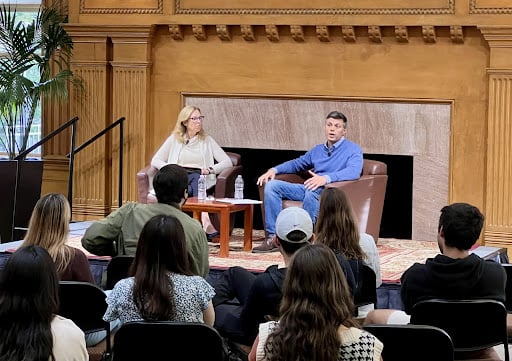Venezuelan opposition leader and pro-democracy advocate Leopoldo López raised concerns about the global rise of autocracy and advocated for democracy and freedom at a Wednesday event.
The event, titled “Facing Autocracy, A Global Challenge,” was hosted at Encina Hall by Stanford’s Center for Democracy, Development and the Rule of Law (CDDRL).
López is a leader of the democratic opposition movement in Venezuela. Today, autocrat Nicolás Maduro leads the Venezuelan state. CDDRL described López’s experience as living “through the gradual deterioration of what was once a regional reference for democracy” that transitioned “into an authoritarian regime that has created the worst humanitarian and migration crisis in the Western Hemisphere.”
López, the founder of the progressive and social-democratic political party Voluntad Popular, opened the talk by detailing his entrance into politics and the journey he took to founding the party. He served as the mayor of Chacao, Venezuela from 2000 to 2008 until he was no longer allowed to run for office because of restrictions instituted by the autocratic national government in Caracas.
López said he was one of many politicians who were targeted by the authoritarian state and disqualified from running for office because of alleged corruption. In response, López founded the Voluntad Popular party, whose mission he said is to ensure “all rights for all people.” López believes this message is representative of “the promised land of democracy.” In addition to promoting candidates for office, Voluntad Popular trains Venezuelans in non-violent protest and civil resistance, according to López.
In 2014, López was federally imprisoned for four years as a political prisoner before being placed under house arrest. He was eventually released in 2019. The cause of the arrest, according to López, was his leadership championing democracy and leading Venezuelans in non-violent protest. He later took refuge in the Spanish embassy in Caracas before moving to Spain in 2020. He has now lived in exile for over a year.
Throughout his talk, López emphasized the importance of democratic advocacy and the necessary steps to prevent the rise of autocracy. He pointed to civil society as a “main indicator of democratic growth,” believing that citizens who are united through a civil society are more inclined to join together to protest and push for democracy. López also advocated for sanctions against Venezuela from democratic world leaders, which he believes are a necessity to influence change in autocratic regimes. He also encouraged increased advocacy for political prisoners, which he described as a “lifeline” during his imprisonment.
Pushing for idealism and optimism in the global fight for freedom, López told attendees to “assuredly believe that we are facing an opportunity to create a global alliance for freedom and usher a fourth wave of democratization.”
“We are in a moment where we are obliged to create a freedom alliance that ignites the spirit of idealism,” López said. The freedom alliance represents López’s ideal coalition of democratic states across the world advocating for democracy. He describes the alliance as “gasoline” for the rise of democracy and the fall of autocratic regimes.
López ended his talk by calling on Stanford students to take responsibility for fighting for freedom globally. The same, he said, goes for institutions such as Stanford, which also have an obligation to promote democracy.
Members of the audience, including students and staff, praised López’s talk.
“Leopoldo Lopez is a champion for freedom in the world, ” said Hoover Institution visiting fellow Markos Kounalakis. “He is passionate and committed and has paid, in many ways, a very high price for his work on behalf of democracy and freedom.”
CDDRL Director Kathryn Stoner said she hopes that López has “inspired Stanford students in the way that he has inspired all of us at CDDRL to take action. Democracy needs defenders.”
Venezuelan student Isabella Pacheco ’24 added that she was “grateful that Stanford is bringing in international politicians and promoting issues that many students may not be aware of.”
